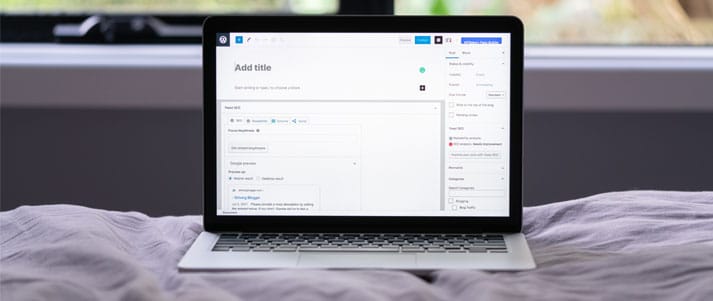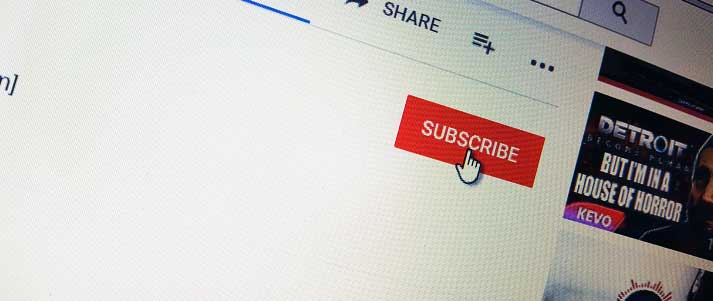20 ways to make money from your website
Now that you've got your website online, how can you make money from it? We share the best ways to start monetising your site today.

Credit: Dean Drobot – Shutterstock
Once you've got your own Bluehost website online (click here for our guide), there's an endless stream of opportunities to start making money.
It's not uncommon for committed bloggers to give up their day jobs after a couple of months. I did!
In this guide, I'll be sharing some of the best ways for you to monetise your website, with plenty of practical tips and resources to get started from day one.
But don't chase them all at once! I strongly suggest picking one or two that resonate with you and your website – and really focusing on them first.
Let's get started (in no particular order) with my 20 ways you can monetise a website!
How to make money from a website
Here are the best ways to monetise your website:
-
Affiliate marketing
Being an affiliate means you promote a product or service to your website's visitors in return for a commission if a purchase occurs through your link.
Join the Awin network to access thousands of affiliate programmes, including major brands like Travelodge, Etsy and Nike.
Then simply include an affiliate link (provided by Awin) when mentioning products from your chosen partners on your website.
See our full guide on getting started and making money with affiliate marketing.
Wondering how to make money online as a student? Check out our guide to making cash fast for some more inspiration.
-
Use Skimlinks
Skimlinks is fairly similar to Awin (and other affiliate networks), allowing you to earn commission on purchases made through links on your site.
The key difference is that as well as allowing you to create individual affiliate links as and when you'd like, Skimlinks can also be installed on your website to automatically monetise your content.
If you link to a merchant in your content that's part of the Skimlinks network, Skimlinks will automatically convert the link into an affiliate link.
You'll get paid if a visitor makes a purchase via your link, and commissions vary from 10% – 15%.
-
Add banner adverts

Credit: bbernard – Shutterstock
You can easily set up network adverts using Google Adsense or Media.net by copying and pasting code into your site to create adverts that are relevant to a visitor's recent internet search.
When you start growing your blog, you can look at more premium ad networks. The best ones require you to have a number of views per month before you can join, but they can quickly become a big money maker for your site.
With 10,000+ monthly views, you can look at Monumetric. Then there are even bigger players, like Mediavine and Raptive, but they require you to have 50,000+ sessions or 100,000+ monthly views (respectively).
However, both networks now offer options for smaller websites outside of their main programmes. Journey by Mediavine welcomes blogs from around 1,000 sessions while Raptive Rise requires 50,000+ monthly views.
Taboola is another increasingly popular service for bloggers monetising their content. It works by displaying relevant articles (rather than banners) from advertisers on their network.
These networks will pay you every time a visitor clicks on an advert (cost per click, or CPC), or per 1,000 impressions (cost per impression, or CPM).
You can also sell banner ads directly to companies with relevant products/services. This option can be much more profitable as, not only will you set the rates yourself, but the advertiser will (hopefully) know that your audience is one that they'd like to target.
-
Use text link advertising
Offer basic text links to an advertiser's website (in-content advertising) and charge a fixed rate per month (e.g. £20). Alternatively, you could charge per click.
There are plenty of marketplaces such as Backlinks and LinksPanel where you can list your offer.
-
Sell to email subscribers
The biggest regret we hear from bloggers is not starting an email list sooner.
Get an account with AWeber from day one to capture your audience and communicate with them after they've left the site.
You can then email them with recommended products that they might be interested in (affiliate promotion), and earn various commissions if they sign up or buy something.
-
Publish sponsored posts
Sponsored posts, sometimes known as advertorials, are adverts in the form of an article, usually containing the advertiser's website link.
An advertiser may send you the article, but if you can write the content for them, you'll be quids up as you can charge for your time too.
You can earn £35 to £1,000+ for a sponsored post, depending on your website's popularity.
Join blogger network groups on Facebook and share your website, as that's where the advertisers are looking.
Note: Advertising regulations state if you're paid to publish an article on your site by a third party, you must always write "Sponsored Post" on the page somewhere.
-
Review products

Credit: Kalamurzing - Shutterstock
This one is especially applicable if you've got a niche readership, like new parents or keen gamers.
But even if your readers aren't from a specific pool, you can still get on the product-testing gravy train. As long as you're happy to write a review of the product after trying it out, companies will be more than happy to send some freebies your way – and possibly even pay you!
Sign up with Toluna as soon as possible to receive the latest opportunities.
-
Sell digital products
eBooks, printables, graphics, templates and podcasts are all examples of digital products that can help you earn an ongoing passive income from your site.
You could charge around £2.99 for a 5,000-word eBook. It doesn't sound like much, but 20 eBook sales per month will soon add up.
Check out the Envato Marketplace for inspiration and ideas.
-
Sell physical products
Use your website as a base to sell physical products too. For example, you can create designs for t-shirts or mugs with Zazzle – perhaps even with your site's branding on it if you think people would buy it.
A top way to sell products online is by creating an e-commerce website. To help you get started, we have loads of tips on starting a Shopify store.
While Shopify is a great platform, it's not your only option. Find more ideas in our guide to the best e-commerce website builders.
You can also create handmade products to sell on eBay or other sites like Etsy.
But wherever you're selling, just make sure you link to the marketplace from your site – straight off the bat, that'll give you an advantage over the other sellers on the platform.
-
Include a business directory
Set up a business directory page, where companies pay you a set fee to have their business listed.
You could charge a monthly or annual listing fee and charge anything between £20 – £500 (and beyond) per year, depending on your site's traffic levels.
For example, say you had a website reviewing sound systems. Assuming that sites like Amazon are probably already pretty popular, you could charge independent retailers (both offline and online) to feature on a page listing places that sell top-of-the-range speakers.
-
Publish premium articles

If you can create incredibly useful content, you can earn from it.
Let's say you have a gaming website, and you're able to share some little-known strategies in an article. You can hook the visitor in by sharing a few tips, and then linking to a password-protected page (this is an option within WordPress) for the most valuable information.
The reader gets the password to unlock the premium content once they've paid a fee to you via PayPal. Charge what you like, although £2 – £10 is a realistic price for a premium article.
You may have seen some of the big media outlets, like The Telegraph and The Times, using this strategy, so clearly it's got some merit.
-
Add a membership forum
You can add a 'members-only' forum to your site through the use of free WordPress plugins like bbPress. You can then monetise this by charging a regular subscription, or a one-off access fee.
Crucially, the amount you can earn depends on how much value you can create for forum members. If you can turn your forum members into a real community – one that networks and shares tips – you're onto a winner.
-
Create an online course
Create an online course as an add-on for your website. This is another type of paid premium content where visitors pay to access additional information.
The course can be delivered automatically via AWeber to those who've paid and subscribed with their email address, or you can add it to Udemy to reach a wider customer base.
Check out our guide to free online courses if you're after a bit of inspiration, or just have a think about what your readers might be interested in. If your website is about arts and crafts, for example, you could have a course teaching people how to crochet.
-
Create your own affiliate programme
Once you've created your website product(s), such as a course or an eBook, you can create an affiliate programme and recruit affiliates to help spread the word.
This can lead to more product sales and more traffic for your website. It's a win-win, and there are plenty of free WordPress plugins to get you started.
We work with a lot of brands here at Save the Student, and while a fair few tend to use networks like Awin to handle their affiliate marketing, many others (including Amazon, most notably) go it alone. In other words, either way can work.
-
Create a 'Hire Me' page

When you build a website, you'll develop some new skills that will help you earn money on the side, too.
Set up a 'Hire Me' page on your site and offer freelance blogging and writing services to start with. If you took a more involved role in setting up the nuts and bolts of your website, why not also advertise your services as a developer?
Beyond your site, you can offer these services via Upwork as well. A freelance writer can make pretty good money of around £15 – £50+ per hour depending on experience.
And Upwork isn't the only freelancing site out there. Read our freelancing guide for more tips, including the best sites for advertising your services.
-
Ask for donations
Add a simple PayPal donation button on your website and ask people to donate a couple of quid (the equivalent of buying you a coffee) if they like your content. You could also link to your Buy Me A Coffee page if you have one.
Some of the biggest websites out there run either partly or solely on donations, including your friend and mine, Wikipedia.
Ultimately, if you don't ask, you don't get.
-
Create an Amazon store page
The beauty of Amazon is that it sells pretty much everything you could ever want. No matter what your website is about, there's a good chance that Amazon sells relevant products.
You can easily add a separate Amazon store page to your website. If people see you as an authority on your topic, they'll listen to your recommendations about which products to try that are relevant to them.
Join the Amazon affiliate program and you'll earn anything from 1% – 20% commission on product sales if one of your readers buys something through your link.
-
Create video content on YouTube

Credit: Abdie - Shutterstock
Creating video content for your website will not only help you to keep visitors entertained, but it could also earn you cash.
One of the ways you can monetise video content is by uploading it to YouTube and setting up Google Adsense (Google have a handy guide). And while you're at it, check out our guide to making money from YouTube.
Once you've created your video content, you can then embed your YouTube videos onto your blog. If your video goes viral, you can earn hundreds in ad revenue.
-
Become a consultant
If you're an expert in a field, why not share your knowledge in return for an hourly consultancy fee?
Advertise via your website and deliver your expertise through monetised webinars and podcasts, or even a video call where visitors pay upfront to benefit from your knowledge.
Whatever channel you choose, if people come to your website for your expert explanations and opinions, you should definitely consider charging for some tailored advice.
-
Sell your website
Once you have a website that's already monetised and receiving good levels of traffic, you'll have an asset.
As with any asset, your website can be sold and, when the time is right, websites like Flippa and the aptly named BusinessesForSale.com are there to help you find a buyer.
Expect to earn two to three times your website's annual profit if you decide to sell.
This list is just the tip of the iceberg. Its purpose is to inspire you to take real action and get your website going, knowing there's a HUGE opportunity to make money down the line.
If you still haven't got your website set up, do it right now. We have a step-by-step guide on how to start a website using Bluehost and WordPress.
You don't need to be a techie to start your own site – as my own grandma has proven!








